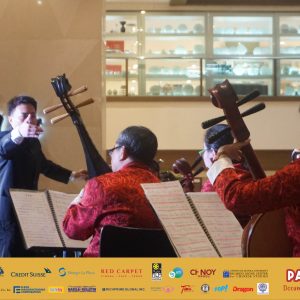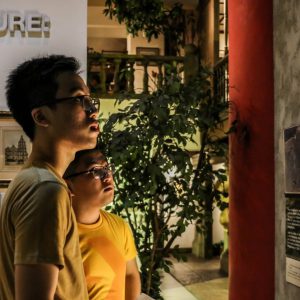Ateneo Celadon is an organization that mainly celebrates appreciation for Chinese-Filipino culture, which is the primary reason as to why the members it mostly attracts are mostly from the culture it represents This, in turn, leads some members of the Ateneo community to label Celadon as “that Chinese org” instead of “the Chinese-Filipino culture org.
“My Chinese friend and I passed by the Celadon booth during RecWeek and he was being asked to join,” says Phil Lizarda, one of the Filipinos in Celadon, on his rationale for joining the org, “and I was as well. So I thought, ‘Why not? Marami naman akong Chinese friends’, so I joined.”
Frich Artificio, on the other hand, was part of the people who held the belief that the Celadon was only for the Chinese-Filipinos. “A PE classmate invited me. He told me non-Chinese could join. So I joined to try it out,” he adds.
For Erika Angeles, Celadon’s Vice-President for Corporate Relations, her reason is linked with her studies. “I’m taking Chinese Studies as my major because my Mom believed that it can take me to my Chinese roots so sige, ‘yun ‘yung na-take ko”, adds Erika, who is half-Chinese raised in a Filipino setting.
For them, Celadon is no different from other orgs in such a way that they are able to interact and bond with the members. “It’s really very casual lang talaga”, Phil states. “They’re even the ones initiating the conversation most of the time.” Erika affirms this statement with her experience as a member of the org’s executive board (EB). “The EB doesn’t make you feel OP at any point and they don’t force in culture. More like share lang”, she adds. “If di mo type, OK lang.”
One might hastily assume the probable hurdle of the language barrier, considering that most of the members slip to using different Chinese dialects, such as Fookien or Mandarin, in the middle of conversation and that Filipinos are only well-versed in English and Filipino, but this is rarely an issue in the organization.
“I couldn’t understand [the Celadon members] when they speak Chinese,” says Frich. “There are some times when my Celadon friends tell me Ni hao (Mandarin for “hello”) and I feel stupid not knowing it because it just means ‘hello’, but it doesn’t hinder communication anyway.”
As stated earlier, Celadon is not just for the Chinese student population to have an org, but rather, one for Chinese culture, a culture that Phil appreciates even before joining the org. “I had Chinese friends that I met in high school for debate and athletic competitions, so they introduced me to different aspects of the culture back then,” he says, “but Celadon makes me appreciate the culture more”.
The cultural aspect was what initially made Erika hesitant to join the org. “I had no idea how to go about it kasi I [am not immersed in] the [sic] Chinese culture,” said Erika, “pero joining (Celadon) made me learn a lot and realize that I missed out on much of it since I did not come from a Chinese school.”
As part of the organization’s executive board, Erika is a constant figure in the org room, playing Mahjong and chatting up with the members. As Vice-President of Corporate Relations, her committee bridges Celadon to companies and organizes the Marketing Seminar, together with the Elements privilege card.
Phil is fairly active in Celadon, being part of the organization’s Junior Manager Program (JuMP), a series of leadership seminars that train the next generation of managers. He also volunteered for the Mid-Autumn Festival and the Teachers’ Appreciation Week.
Phil initially had doubts about the organization, sensing that he may not be able to strike a chord with the members, mostly due to the stigma concerning Celadon.
“I’m lucky to have tried an org wherein most people would think I wouldn’t fit in, but the complete opposite happened, he speaks. “You’ll never really know until you’ve tried it, and I can guarantee that Celadon will be worth the effort.”
Truly, these doubts about fitting in with the Chinese-Filipino community in Celadon as well as understanding their culture may raise doubts on Filipinos to try and join Celadon. One must see Celadon not as an exclusive community but for what it is: a college organization that broadens horizons, improves its members, and as Erika sagely puts it, unites by one goal: “tikoy during the Chinese New Year.”
Written by Rainier David
Illustration above by Eliza Cua




